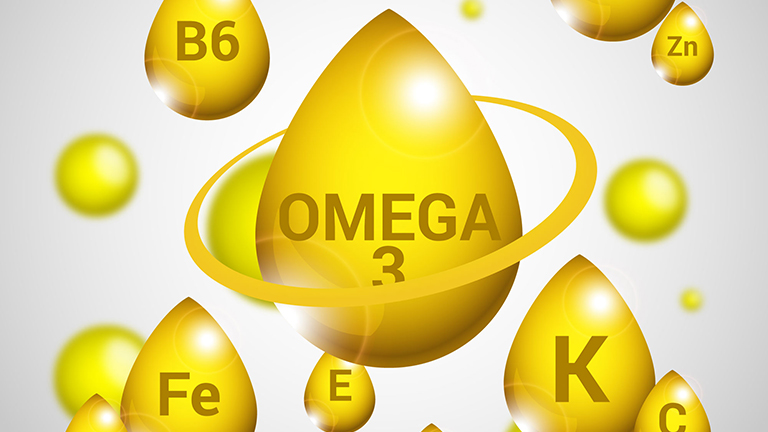Omega 3 for Brain Health: Omega 3 fatty acids are essential polyunsaturated fats that play a crucial role in brain function and overall mental well-being. Unlike other nutrients, omega 3 cannot be synthesised efficiently by the human body, which makes dietary intake critical. The brain, composed of nearly 60% fat, relies on omega 3 fatty acids to maintain neuronal integrity, support synaptic plasticity, and regulate neurotransmitter function. Studies show that omega 3 intake is directly associated with enhanced cognitive performance, improved memory retention, and reduced risk of neurodegenerative diseases.
The primary omega 3 fatty acids that influence brain health are docosahexaenoic acid (DHA) and eicosapentaenoic acid (EPA), commonly found in fatty fish, while alpha-linolenic acid (ALA) is a plant-based omega 3 that can be converted to DHA and EPA in limited amounts. Regular consumption of these fatty acids supports learning, mental clarity, and emotional balance, which are essential for daily productivity and long-term cognitive resilience.
Key Types of Omega 3 for Cognitive Function (DHA, EPA, ALA)
Omega 3 is not a single nutrient but a family of essential fatty acids, each with unique roles in brain health. DHA is a structural component of brain cell membranes, critical for maintaining flexibility and communication between neurons. Adequate DHA levels are linked to better memory, faster learning, and emotional stability. EPA, on the other hand, is more involved in regulating inflammation in the brain, which can prevent cognitive decline and reduce the risk of depression. ALA, commonly found in flaxseeds, chia seeds, and walnuts, is a precursor to DHA and EPA, but the conversion rate is relatively low in humans. Therefore, direct intake of DHA and EPA is recommended for optimal cognitive function.
Research indicates that a combination of DHA and EPA supplementation provides the most comprehensive benefits for brain performance. Individuals with diets low in omega 3 are at a higher risk of developing attention disorders, memory deficits, and mood imbalances. Understanding the specific functions of each omega 3 type allows for more targeted dietary planning and supplementation.
Benefits of Omega 3 for Memory, Focus, and Mood
Omega 3 fatty acids contribute significantly to memory enhancement, concentration, and mood regulation. Regular intake of DHA and EPA supports the structure of synaptic membranes, facilitating efficient communication between neurons, which directly improves memory and learning. Clinical studies have shown that individuals who consume omega 3-rich diets perform better on cognitive tasks, exhibit sharper focus, and display faster information processing.
Beyond cognitive performance, omega 3 plays a vital role in mood stabilisation. EPA, in particular, has anti-inflammatory properties that reduce symptoms of depression and anxiety by modulating neurotransmitter pathways in the brain. Supplementation with omega 3 has been linked to improved emotional regulation, reduced irritability, and lower stress levels. For students, professionals, and older adults, integrating omega 3 into daily nutrition can significantly enhance productivity and overall mental well-being.
Omega 3 and Prevention of Cognitive Decline
Cognitive decline, including conditions like Alzheimer’s disease and dementia, is a growing concern globally, especially in aging populations. Omega 3 fatty acids have neuroprotective properties that slow down the progression of neurodegenerative disorders. DHA is integral to maintaining brain volume, supporting neurogenesis, and reducing amyloid plaque formation, which is associated with Alzheimer’s disease. Additionally, EPA’s anti-inflammatory action helps prevent neuronal damage caused by chronic inflammation.
Epidemiological studies show that populations with high fish consumption, such as in Japan and the Mediterranean region, have lower rates of cognitive decline and dementia. Integrating omega 3 into diets across the USA, UK, Canada, and other countries can serve as a preventative strategy against memory loss, attention deficits, and age-related cognitive impairments.
How Omega 3 Improves Neuron Communication
Neurons communicate through synapses, where electrical and chemical signals transmit information throughout the brain. Omega 3 fatty acids, particularly DHA, are essential components of the phospholipid bilayer of neuronal membranes. These fatty acids increase membrane fluidity, allowing neurotransmitters to move efficiently and enhance signal transmission. Improved neuron communication directly translates to sharper focus, better memory consolidation, and faster cognitive processing.
Additionally, omega 3 modulates neurotransmitters like serotonin and dopamine, which influence mood, learning, and motivation. By maintaining optimal synaptic function, omega 3 ensures that cognitive abilities remain strong, even under stress or as the brain ages.
Omega 3 for Brain Health
| Omega 3 Type | Primary Sources | Role in Brain Health | Recommended Daily Dosage | Additional Benefits |
| DHA (Docosahexaenoic Acid) | Fatty fish (salmon, mackerel, sardines), algae oil | Structural component of brain cell membranes, supports memory and learning | 250-500 mg for adults; 100-200 mg for children | Improves neuronal communication, supports visual and cognitive development in children |
| EPA (Eicosapentaenoic Acid) | Fatty fish, krill oil, fish oil supplements | Reduces brain inflammation, supports mood regulation and mental health | 250-500 mg for adults; consult doctor for children | Helps reduce anxiety, depression, and emotional stress |
| ALA (Alpha-Linolenic Acid) | Flaxseeds, chia seeds, walnuts, hemp seeds | Precursor to DHA and EPA, supports overall brain function | 1.1-1.6 g for adults; 0.9-1.3 g for children | Supports heart health, anti-inflammatory effects, and general cognitive function |
| Fish Oil | Supplements derived from fatty fish | Provides concentrated DHA and EPA for brain health | 500-1000 mg combined DHA+EPA per day | May improve memory, focus, and reduce cognitive decline risk |
| Krill Oil | Supplements derived from small crustaceans | High bioavailability, reduces inflammation, supports cognition | 500 mg per day (varies by product) | Antioxidant benefits, supports cardiovascular and brain health |
| Algal Oil | Plant-based supplement | Direct source of DHA for vegetarians and vegans | 250-500 mg per day | Supports brain development in children and adults, eco-friendly option |
DHA vs. EPA: Which One is Better for the Brain?
While both DHA and EPA are vital for cognitive health, their roles differ slightly. DHA is predominantly structural, forming the backbone of brain cells and influencing synaptic plasticity. Without sufficient DHA, neurons may lose flexibility, leading to impaired learning and memory. EPA, however, is more functional, focusing on reducing inflammation and supporting mental health by regulating neurotransmitters.
For comprehensive brain support, experts recommend a combination of DHA and EPA. A diet rich in fatty fish, such as salmon, mackerel, and sardines, or high-quality supplements ensures an adequate supply of both. For individuals with mood disorders or cognitive decline, EPA-rich supplementation may offer additional benefits.
Omega 3 Foods for Brain Health
Omega 3 fatty acids are essential for optimal brain function, memory, mood regulation, and prevention of cognitive decline. Including omega 3-rich foods in your diet ensures that your brain receives the necessary nutrients to maintain neuronal communication and overall cognitive performance.
Fatty Fish (High in DHA & EPA)
Fatty fish are the richest natural sources of DHA and EPA, the two omega 3s most critical for brain health. Regular consumption supports memory, focus, and mental clarity.
- Salmon – Excellent for DHA, improves memory and learning, and reduces inflammation.
- Mackerel – High in EPA, supports mood regulation and cognitive performance.
- Sardines – Packed with DHA and EPA, beneficial for attention and synaptic function.
- Rainbow Trout – Supports neuronal communication and emotional balance.
- Tuna – Boosts memory retention and protects against cognitive decline.
Plant-Based Sources (High in ALA)
Plant sources provide ALA, which the body can partially convert to DHA and EPA. These are especially important for vegetarians and vegans.
- Flaxseeds – Rich in ALA, supports cognitive function and mental clarity.
- Chia Seeds – High in ALA, improves focus and brain performance.
- Walnuts – Provide ALA and antioxidants, support memory and emotional health.
- Hemp Seeds – Contain ALA, promote brain development and neuroprotection.
- Soybeans – A plant-based source of ALA, supports attention and learning.
Algal Oil (Vegan DHA Source)
Algal oil is derived from algae and provides direct DHA, ideal for those avoiding animal products. It supports memory, learning, and overall brain health without relying on fish.
Other Omega 3-Rich Foods
- Eggs enriched with Omega 3 – Boost DHA levels in the brain, supporting cognitive performance.
- Seaweed – Contains small amounts of DHA and EPA, supports brain development in children.
- Brussels Sprouts & Spinach – Contain ALA and antioxidants, promoting neuronal health.
Incorporating Omega 3 Foods Into Daily Diet
To maximise cognitive benefits:
- Include fatty fish in meals at least 2-3 times per week.
- Add chia or flaxseeds to smoothies, oatmeal, or salads.
- Snack on walnuts or hemp seeds for mental clarity and focus.
- Consider algae-based supplements if vegetarian or vegan.
Regular intake of these omega 3 foods supports memory, attention, mood, and long-term brain health, making them essential components of a cognitive-boosting diet.
Best Natural Sources of Omega 3 for Brain Health
Incorporating omega 3 into the diet is essential for maintaining optimal cognitive function. Fatty fish such as salmon, mackerel, sardines, and trout are the most effective sources of DHA and EPA. Plant-based options, including flaxseeds, chia seeds, hemp seeds, and walnuts, provide ALA, which the body partially converts to DHA and EPA.
Other dietary sources include algae oil, which offers a direct plant-based supply of DHA, and fortified foods like omega 3-enriched eggs. Combining these sources ensures consistent intake and supports brain performance. For individuals following vegetarian or vegan diets, algae oil supplements are a reliable alternative to fish-derived omega 3.
Recommended Omega 3 Dosage for Adults and Children
The optimal dosage of omega 3 varies depending on age, health status, and cognitive needs. For adults, research suggests 250-500 mg of combined DHA and EPA per day for general brain health. Individuals aiming to improve memory, focus, or mood may benefit from higher intakes, often in the range of 1,000-2,000 mg daily under professional supervision.
Children require lower doses but still benefit from omega 3 for brain development. A daily intake of 100-200 mg of DHA is recommended for infants and toddlers, while school-aged children may need 250-500 mg per day. Supplementing with omega 3 during critical periods of brain growth can enhance learning capacity, attention span, and emotional regulation.
Omega 3 Supplements: Fish Oil, Krill Oil, and Algal Oil
For individuals unable to meet omega 3 requirements through diet alone, supplements provide a convenient solution. Fish oil supplements are the most widely studied and offer a concentrated source of DHA and EPA. Krill oil, derived from small crustaceans, provides omega 3 in phospholipid form, which may improve absorption and bio availability. Algal oil supplements, ideal for vegetarians and vegans, deliver direct DHA without reliance on fish sources.
When selecting supplements, quality, purity, and sustainability should be considered. Third-party testing for heavy metals and other contaminants ensures safety, while proper dosage labeling supports effective brain health outcomes.
Best Omega 3-Rich Foods by Country
| Country/Region | Top Omega 3-Rich Foods | Type of Omega 3 | Brain Health Benefits |
| USA | Salmon, Mackerel, Sardines, Flaxseeds, Chia Seeds, Walnuts | DHA, EPA, ALA | Supports memory, focus, mood regulation, and cognitive function; reduces inflammation |
| UK | Herring, Sardines, Trout, Walnuts, Flaxseed Oil | DHA, EPA, ALA | Enhances learning and attention; prevents age-related cognitive decline; supports mental clarity |
| Canada | Atlantic Salmon, Rainbow Trout, Whitefish, Chia Seeds, Hemp Seeds | DHA, EPA, ALA | Improves synaptic plasticity, neuronal communication, and emotional health; reduces risk of dementia |
| Japan | Mackerel, Sardines, Tuna, Seaweed, Flaxseeds | DHA, EPA, ALA | Supports brain development in children, boosts memory and focus, prevents neurodegeneration |
| Mediterranean Region | Sardines, Anchovies, Salmon, Walnuts, Flaxseeds | DHA, EPA, ALA | Enhances cognitive performance, mood stabilisation, and mental resilience; lowers risk of cognitive decline |
| Australia | Salmon, Tuna, Sardines, Chia Seeds, Macadamia Nuts | DHA, EPA, ALA | Supports long-term memory, focus, and neuroprotection; reduces inflammation in the brain |
| Global Vegan Options | Algal Oil, Flaxseeds, Chia Seeds, Hemp Seeds, Walnuts | DHA, ALA | Provides essential brain-boosting nutrients; supports memory, learning, and emotional balance |
Signs of Omega 3 Deficiency in the Brain
Omega 3 deficiency can negatively impact cognitive performance and emotional health. Common signs include poor memory retention, difficulty concentrating, mood swings, fatigue, and increased susceptibility to stress. Children with low omega 3 intake may exhibit attention deficits and learning challenges. Chronic deficiency can contribute to long-term risks such as cognitive decline, depression, and neuro inflammation.
Recognising these signs early allows for dietary adjustments or supplementation to restore optimal brain function. Regular consumption of omega 3-rich foods or supplements can prevent these deficiencies and support lifelong cognitive wellness.
Omega 3 and Mental Health: Anxiety, Depression, and Stress
The benefits of omega 3 extend beyond cognitive performance to mental health. EPA, in particular, has been associated with reducing depressive symptoms by modulating inflammatory pathways and neurotransmitter activity. Studies show that omega 3 supplementation can lower anxiety levels, improve emotional resilience, and enhance stress management.
By supporting brain structure and function, omega 3 helps regulate the hypothalamic-pituitary-adrenal (HPA) axis, which controls the body’s stress response. Individuals experiencing chronic stress, mood fluctuations, or anxiety disorders may find omega 3 supplementation beneficial alongside professional mental health care.
Combining Omega 3 with Other Brain-Boosting Nutrients
While omega 3 is vital for cognitive function, combining it with other nutrients can amplify brain health benefits. Vitamins B6, B12, and folate support neurotransmitter synthesis and energy metabolism. Antioxidants such as vitamin E and polyphenols protect neurons from oxidative stress, while magnesium enhances synaptic plasticity and learning.
A balanced diet rich in omega 3, vitamins, minerals, and antioxidants provides comprehensive support for memory, focus, and emotional well-being. Nutrient synergy ensures that the brain receives all the essential compounds for optimal performance and longevity.
Potential Side Effects and Safety Tips
Omega 3 is generally safe when consumed in recommended amounts. However, excessive intake may cause gastrointestinal issues, such as bloating, diarrhea, or fishy aftertaste. High doses can also increase bleeding risk in individuals taking anticoagulants. Pregnant and breastfeeding women should consult healthcare providers before supplementation.
Choosing high-quality, purified supplements and adhering to dosage recommendations minimises risks while maximising cognitive benefits. Incorporating omega 3 gradually into the diet allows the body to adapt and ensures optimal absorption.
Lifestyle Tips to Enhance Brain Function Along with Omega 3
Diet alone is not enough to maintain peak cognitive performance. Lifestyle factors such as regular exercise, adequate sleep, and mental stimulation complement omega 3 intake. Aerobic exercise increases blood flow to the brain, promoting neuron growth and synaptic plasticity. Sleep supports memory consolidation and neurotransmitter balance, while challenging cognitive tasks stimulate neural networks.
Integrating omega 3 supplementation with a holistic approach to brain health ensures long-term benefits, reduces cognitive decline risk, and improves quality of life.
Conclusion: Omega 3 for Brain Health
Omega 3 fatty acids are essential nutrients for maintaining optimal brain health, improving memory, focus, and emotional well-being. DHA and EPA, found primarily in fatty fish and high-quality supplements, support neuronal communication, reduce inflammation, and protect against cognitive decline. Plant-based sources like flaxseeds, chia seeds, walnuts, and algae oil provide ALA and DHA alternatives for vegetarians and vegans, ensuring everyone can benefit from these brain-boosting nutrients.
Incorporating omega 3-rich foods into your daily diet, along with a healthy lifestyle including regular exercise, adequate sleep, and mental stimulation, can significantly enhance cognitive performance and long-term brain resilience. Populations in the USA, UK, Canada, and worldwide can benefit from understanding the best omega 3 sources and maintaining consistent intake to support mental clarity and overall brain function.
For more guidance on optimising brain health and choosing the best omega 3 supplements, check these resources:
By prioritising omega 3 intake, you’re not only supporting your memory and focus today but also protecting your brain for the future. Make omega 3 a cornerstone of your daily nutrition to experience long-lasting cognitive benefits.



